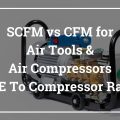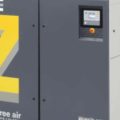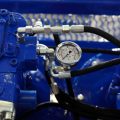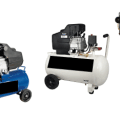Hey! This site is reader-supported and we earn commissions if you purchase products from retailers after clicking on a link from our site.
CFM is a very important consideration for any air compressor. This page will provide you with all the relevant information on what CFM means, CFM full form in compressor, and more, so that you fully understand the CFM meaning.
Table of Contents
- What Is CFM on an Air Compressor?
- What Does CFM Mean?
- Air Compressor HP to CFM Calculation (Rule of Thumb)
- Air Compressor kW to CFM Calculation (rule of thumb)
- An Exception to the Rule of Thumb
- What About SCFM?
- CFM Full Form in Compressor Differences
- FAQs (Frequently Asked Questions)
- Reader Questions and Responses
What Is CFM on an Air Compressor?
CFM on an air compressor is the unit of measure for the maximum air volume of discharge air from a compressor over time or Cubic Feet per Minute. CFM measures volume. Its units are therefore based on volume/time. An air compressor’s CFM stands for how much air it can deliver to the air tool over a period of time – different power air tools will have different CFM requirements, therefore your air compressor’s CFM determines which power air tools it can and cannot power effectively.
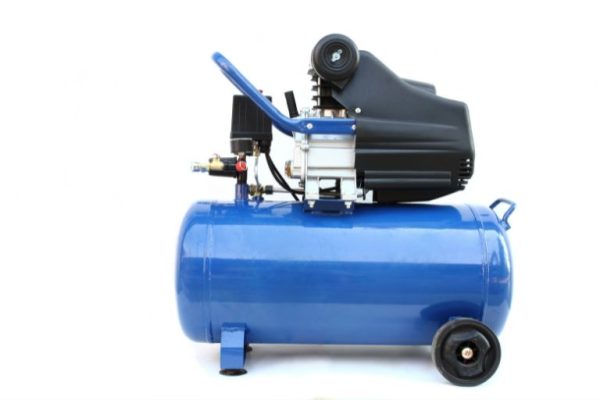
What Does CFM Mean?
CFM means Cubic Feet per Minute. A compressor has a specific number of cubic feet of compressed air per minute (CFM) of flow from its discharge port.
When it comes to using compressed air in your plant or home workshop, you will want to know how many cubic feet per minute you can expect from the discharge port of your compressor. This will help determine how much air that air compressor is capable of providing to power your air tools or other air-consuming applications.
To do that you need to know what CFM a particular device or tool will require to function within its design parameters. The device or tool will require a certain number of CFM at a specific air pressure, to work properly.
Air Compressor HP to CFM Calculation (Rule of Thumb)
A rule of thumb for HP to CFM is that each 1 HP motor size generates about 3-4 CFM of compressed air flow at about 90 PSI (psi measures pressure). You can learn more about air compress pressure here.
CFM to HP – Rule of thumb
CFM to HP can be understood as 1 CFM to 0.25-0.33 HP at 90 PSI when looking at it the opposite way.
Air Compressor kW to CFM Calculation (rule of thumb)
A rule of thumb is that each 1 kW of compressor power generates about 4-5.5 CFM of compressed air flow at about 90 PSI.
Or, the equivalent of 1 CFM to 0.18-0.25 kW at 90 PSI.
An Exception to the Rule of Thumb
This air production by each HP of motor size is pretty much an industry standard, though it doesn’t apply as accurately to compressors under 10 HP. For compressors smaller than 10 HP, you will need to read the performance specifications for that particular unit to determine their exact flow and pressure rate capabilities or use the “guestimate” of 2-3 cubic feet per minute of discharge flow at 90 PSI, per HP of electric motor.
When you have sized all of your applications and totaled up all of the air you’re going to need now and for any prospective plant or air demand increases for the air-powered machinery, and you are out searching for the right air compressor, you would divide the number of CFM you need by 4, and that will give you a rough idea of the horsepower rating of the compressor required.
If you’re wondering how to increase CFM on your air compressor, we have a detailed guide!
What About SCFM?
SCFM is another unit of measure you’ll be familiar with in the world of compressed air and in particular, compressed air tools. You should take a look at my article on the difference between SCFM and CFM to enhance your understanding in this area – it’s a bit beyond the scope of this article!
CFM Full Form in Compressor Differences
Not all compressor manufacturers rate their compressor output the same way. You might see a compressor showing a discharge rate at what appears to be an acceptable and good CFM, but on closer inspection find that the figure is predicated on a much lower pressure than you might need.
Discharge rates in cubic feet per minute at higher pressures are always quite a bit lower than discharge rates at lower pressures, for that same compressor.
Ensure that the unit you select will give you both the CFM full form in the compressor you need, and the pressure your equipment demands to work properly for you.
FAQs (Frequently Asked Questions)
For small portable air compressors, a good measure airflow is between 0.1-5 CFM and for larger stationary compressors anything more than 10 CFM will be good.
It is said that one CFM is needed per square foot of floor area. This is based on an averaged heat load calculation for comfort cooling.
CFM is cubic feet per minute, an indication of the air compressor’s flow rate – or the amount of air that the air compressor motor pump can produce at a given pressure.
In general yeah, the higher CFM (cubic feet per minute) rating the better. This is because the more CFM you have, the greater the amount of air you’re able to deliver, and is better suited to heavier applications.
Additional CFM reading:
- SCFM Vs ACFM Vs ICFM – What’s The Difference? Converting & Calculating
- Best Ways to Increase CFM On Air Compressors
- Connecting Two Air Compressors Together
- How to Calculate CFM of Air Compressors
- CFM Pipe Size Chart
- SCFM vs CFM for Air Tools & Air Compressors Guide to Compressor Ratings
- Air Compressor Size For Spraying Stucco & Plaster
- Does a die grinder require low or high CFM?
- Speedaire 4B247 swapped with 2Z499 and its effect on CFM?
- 20 CFM Air Compressor – Buying, Hiring, What Can They Run?
- Air Compressors That Produce 500 CFM And Above
- CFM SCFM PSI Compressor Flow Issues
- Ingersoll Rand Type 30 model 242 HP and CFM?
- CFM rating of Black Max compressor
How much CFM do I need?
- What Size Air Compressor Do I Need? How to Size An Air Compressor
- What Size Air Compressor Do I Need For Impact Wrench?
- What Size Air Compressor For Sander?
- What Size Air Compressor For Sandblasting?
- What Size Air Compressor For Framing Nailer?
- What Size Air Compressor For Air Hammer?
- What Size Air Compressor For Air Ratchet?
- What Size Air Compressor for Car Detailing?
- What Size Air Compressor for Truck Tires?
- What Size Air Compressor For Nail Gun
- What Size Air Compressor for Painting Cars?
- What Size Air Compressor Do I Need for Spray Painting?
- What Size Air Compressor For Staple Gun Or Upholstery Air Stapler?
- What Size Air Compressor For Sandblasting?
- What Size Air Compressor Do I Need For A Die Grinder?
Reader Questions and Responses
Does a 2 HP Compressor Equal 8 CFM?
Question
Hello, I have been reading through your site trying to find information that will help me purchase the right air compressor… from reading your info I think that I might understand it but I just want some clarification.
I am buying an air ratchet that requires 5.5 scfm@ 90psi… you stated that the rule of thumb is 4 cfm@ 90 psi for every hp… so does that mean if I buy a 2hp compressor should I assume that it will provide me 8cfm@90psi per the rule of thumb?
For example, I have seen some compressors with the specs on the unit that states 3.5 scfm@ 90psi and 5.0 scfm@ 40psi and this has a motor with 1.5hp…in closing, is there a calculation difference between scfm and cfm, I didn’t see it in your postings.
Response
Hello Clive. Glad to see that you’ve been reading the info on the site. That’s gratifying.
Yes, the rule of thumb is that you will get about 4 CFM of compressed air for every HP of the electric motor.
I also say in many places that this rule applies to compressors over 10 HP. Why? Because they will typically be powered by at least 220 Volts or more.
The compressor converts electrical energy into stored energy. That conversion process uses the electricity that’s coming from the plug. In the typical DIY shop, that plug will have 110 Volts.
There isn’t enough available energy in a 110 Volt energy supply to produce the compressed air capacity of 4 CFM per 1HP. If you were running 220, you would get that, approximately.
What Is Motor Rating at 25 CFM?
Question
What would be the motor rating of a compressor capable to deliver 25 CFM at 12 psi
I keep looking, but I have not found a formula that will allow me to convert the flow of a compressor at 90 PSI to the flow of that same compressor at 12 PSI, or any other number.
Response
All I can tell you is that you should get around 4 CFM of compressed air flow at around 90 PSI for each HP of the compressor motor.
What that same flow would be at 12 PSI, I can’t figure out. It would be higher, but how much… anyone out there knows?
If you have any questions regarding what is CFM, please leave a comment below, with a photo if applicable, so that someone can help you!

